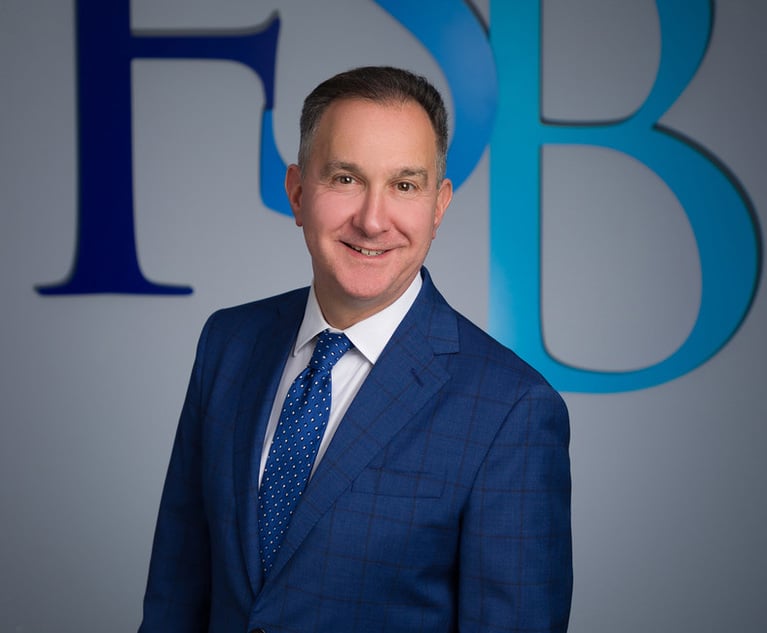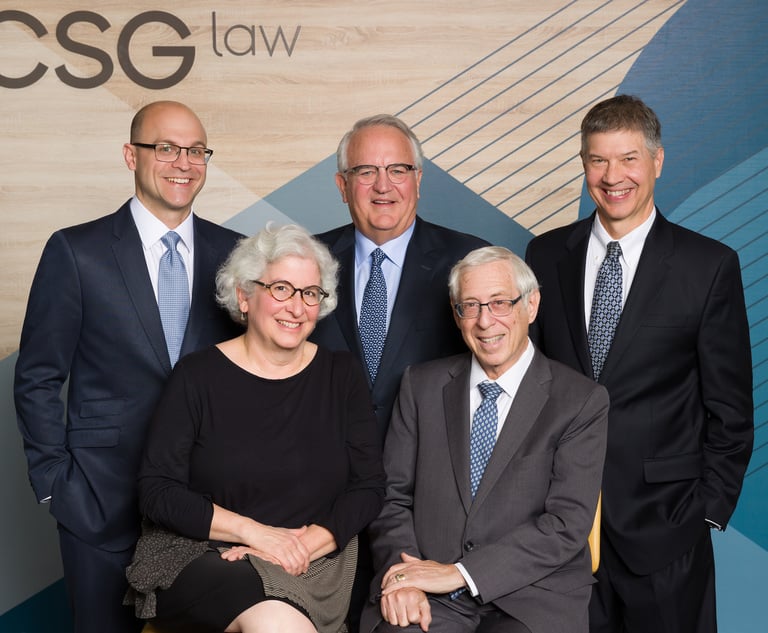Christie Touts Balanced Courts, Bail Reform, Sports Betting Push in Final Address
In Republican New Jersey Gov. Chris Christie's eighth and final state of the state address, he took the opportunity to boast of his record on taxes, the economy and jobs, but also pointed to a near fully populated state court bench and the revamped bail system as major accomplishments.
January 09, 2018 at 06:15 PM
6 minute read
 Chris Christie
Chris Christie
Republican New Jersey Gov. Chris Christie delivered his eighth and final state of the state address Tuesday. While he took the opportunity to boast of his record on taxes, the economy and jobs, he also pointed to a near fully populated state court bench and the revamped bail system as major accomplishments.
Christie, the first governor since Thomas Kean to serve two full four-year terms, said the state is better off than when—nine years ago, as U.S. attorney for the District of New Jersey—he decided to run for governor.
“We need to remember where we were nine years ago, on the brink of financial ruin as a state,” he said. “We needed tough leadership to deal with these problems.”
Christie noted that when he took office, the state's unemployment rate was at around 10 percent, and that it has now been reduced to slightly less than 5 percent. He also said his administration deserved credit for creating more than 300,000 new private-sector jobs.
Christie said one of his proudest achievements was repeated rejection of tax increases proposed by Democrats, who control both houses of the Legislature.
“I vetoed income tax increases. I vetoed corporate tax increases,” he said.
Christie did, however, agree to an increase in the state's gas tax in 2016, from 14.5 cents per gallon to 35.5 cents per gallon, to replenish the Transportation Trust Fund.
Christie briefly addressed the status of the state judicial system, but did not discuss his failed attempt to remake the state Supreme Court that began in 2010 with his refusal to nominate Justice John Wallace Jr., a Democrat, for tenure. Senate Democrats in turn repeatedly refused to confirm any of his Republican nominees to replace Wallace, though he eventually was able to have another Democrat, Walter Timpone, fill that seat.
“A smart, politically balanced and fully staffed judiciary should be the goal of every governor,” he said. “It certainly was mine, and we worked hard to make sure the law was followed and that justice was available to all our citizens. State law requires that there is an even distribution between Republicans and Democrats on our Superior Court.
“The law was being ignored when we arrived in Trenton. There were 31 more Democrats than Republicans on the bench. We fought not only to appoint better judges but to ensure the political balance that the law requires,” Christie continued. “While this did lead to moments of strife, in the end, we nearly delivered on all those goals. There are more judges on the bench today than at any time in our history. In fact, there are only 11 vacancies out of 462 judicial seats in our Superior Court. Justice is available to all in every county.
“Just as importantly, we have moved from an imbalance of 31 seats to an imbalance of only 5 seats favoring the Democratic party,” Christie said. “I hope, as we move forward, governors and senators respect the rule of law and finish the job we started—by keeping the bench full and politically balanced.”
Christie also highlighted his efforts to help rebuild Atlantic City and Camden, bail reform and the growing opioid epidemic.
He said the state is eagerly awaiting a ruling by the U.S. Supreme Court in New Jersey's attempt to have legalized sports gambling in Atlantic City, an effort that he said he kept at even when “experts” advised him to abandon it.
Christie did warn the incoming administration of Democratic Gov.-elect Philip Murphy that the pension system for the state's public-sector workers needs more reform, above what he and lawmakers achieved in 2011 when they passed legislation requiring workers to pay more for benefits.
Christie said that even though he has enjoyed his time as governor, his “happiest days” were when he was the U.S. attorney, from 2002 through 2008.
“After seven years as U.S. attorney, I didn't need to seem to be tough on crime; I am tough on crime,” Christie said, but went on to talk about the importance of second chances underlying the bail reform effort.
Christie did not speak about his failed run for president in 2016, nor the Bridgegate scandal, in which Bill Baroni, a former deputy director at the Port Authority of New York and New Jersey, and Bridget Anne Kelly, who was Christie's deputy chief of staff, were convicted in connection with the September 2013 lane closures at the approach to the George Washington Bridge. Christie himself was never charged with wrongdoing.
Lastly, Christie touted his relationship with Senate President Stephen Sweeney, D-Gloucester, other lawmakers who cooperated with him, and members of his administration.
“As the final hours of our partnership slip away, I am reminded of the great Tennyson quote from 'Ulysses' and believe that it applies to each and every one of you and the road we have traveled together these last 16 years: 'Though much is taken, much abides. And though we are not now that strength which in old days moved heaven and earth, that which we are, we are. One equal temper of heroic hearts, made weak by time and fate, but strong in will. To strive, to seek, to find and never to yield.'
“I leave you today grateful, happy and a better man than I was when I walked in here for the first time eight years ago. For that and so much more, I thank you,” he said.
Christie's last full day in office is Jan. 15.
Sweeney, in a Democratic response following Christie's address, promised ”a different dynamic coming in” with Murphy.
“You're probably not going to be happy because we're not going to fight as much,” at least not publicly, Sweeney told reporters.
“They wouldn't have happened if we didn't support them,” Sweeney said of the highlights Christie talked about in the address. “None of the things the governor talked about would've happened without Democratic support.”
New Assembly Speaker Craig Coughlin, D-Middlesex, said the address “reflects the fact that we can still make a difference.”
— David Gialanella contributed to this report.
This content has been archived. It is available through our partners, LexisNexis® and Bloomberg Law.
To view this content, please continue to their sites.
Not a Lexis Subscriber?
Subscribe Now
Not a Bloomberg Law Subscriber?
Subscribe Now
NOT FOR REPRINT
© 2024 ALM Global, LLC, All Rights Reserved. Request academic re-use from www.copyright.com. All other uses, submit a request to [email protected]. For more information visit Asset & Logo Licensing.
You Might Like
View All
Hit by Mail Truck: Man Agrees to $1.85M Settlement for Spinal Injuries

Appellate Div. Follows Fed Reasoning on Recusal for Legislator-Turned-Judge
4 minute read
Chiesa Shahinian Bolsters Corporate Practice With 5 From Newark Boutique
5 minute read
On the Move and After Hours: Brach Eichler; Cooper Levenson; Marshall Dennehey; Archer; Sills Cummis
7 minute readTrending Stories
- 1Judge Denies Sean Combs Third Bail Bid, Citing Community Safety
- 2Republican FTC Commissioner: 'The Time for Rulemaking by the Biden-Harris FTC Is Over'
- 3NY Appellate Panel Cites Student's Disciplinary History While Sending Negligence Claim Against School District to Trial
- 4A Meta DIG and Its Nvidia Implications
- 5Deception or Coercion? California Supreme Court Grants Review in Jailhouse Confession Case
Who Got The Work
Michael G. Bongiorno, Andrew Scott Dulberg and Elizabeth E. Driscoll from Wilmer Cutler Pickering Hale and Dorr have stepped in to represent Symbotic Inc., an A.I.-enabled technology platform that focuses on increasing supply chain efficiency, and other defendants in a pending shareholder derivative lawsuit. The case, filed Oct. 2 in Massachusetts District Court by the Brown Law Firm on behalf of Stephen Austen, accuses certain officers and directors of misleading investors in regard to Symbotic's potential for margin growth by failing to disclose that the company was not equipped to timely deploy its systems or manage expenses through project delays. The case, assigned to U.S. District Judge Nathaniel M. Gorton, is 1:24-cv-12522, Austen v. Cohen et al.
Who Got The Work
Edmund Polubinski and Marie Killmond of Davis Polk & Wardwell have entered appearances for data platform software development company MongoDB and other defendants in a pending shareholder derivative lawsuit. The action, filed Oct. 7 in New York Southern District Court by the Brown Law Firm, accuses the company's directors and/or officers of falsely expressing confidence in the company’s restructuring of its sales incentive plan and downplaying the severity of decreases in its upfront commitments. The case is 1:24-cv-07594, Roy v. Ittycheria et al.
Who Got The Work
Amy O. Bruchs and Kurt F. Ellison of Michael Best & Friedrich have entered appearances for Epic Systems Corp. in a pending employment discrimination lawsuit. The suit was filed Sept. 7 in Wisconsin Western District Court by Levine Eisberner LLC and Siri & Glimstad on behalf of a project manager who claims that he was wrongfully terminated after applying for a religious exemption to the defendant's COVID-19 vaccine mandate. The case, assigned to U.S. Magistrate Judge Anita Marie Boor, is 3:24-cv-00630, Secker, Nathan v. Epic Systems Corporation.
Who Got The Work
David X. Sullivan, Thomas J. Finn and Gregory A. Hall from McCarter & English have entered appearances for Sunrun Installation Services in a pending civil rights lawsuit. The complaint was filed Sept. 4 in Connecticut District Court by attorney Robert M. Berke on behalf of former employee George Edward Steins, who was arrested and charged with employing an unregistered home improvement salesperson. The complaint alleges that had Sunrun informed the Connecticut Department of Consumer Protection that the plaintiff's employment had ended in 2017 and that he no longer held Sunrun's home improvement contractor license, he would not have been hit with charges, which were dismissed in May 2024. The case, assigned to U.S. District Judge Jeffrey A. Meyer, is 3:24-cv-01423, Steins v. Sunrun, Inc. et al.
Who Got The Work
Greenberg Traurig shareholder Joshua L. Raskin has entered an appearance for boohoo.com UK Ltd. in a pending patent infringement lawsuit. The suit, filed Sept. 3 in Texas Eastern District Court by Rozier Hardt McDonough on behalf of Alto Dynamics, asserts five patents related to an online shopping platform. The case, assigned to U.S. District Judge Rodney Gilstrap, is 2:24-cv-00719, Alto Dynamics, LLC v. boohoo.com UK Limited.
Featured Firms
Law Offices of Gary Martin Hays & Associates, P.C.
(470) 294-1674
Law Offices of Mark E. Salomone
(857) 444-6468
Smith & Hassler
(713) 739-1250






